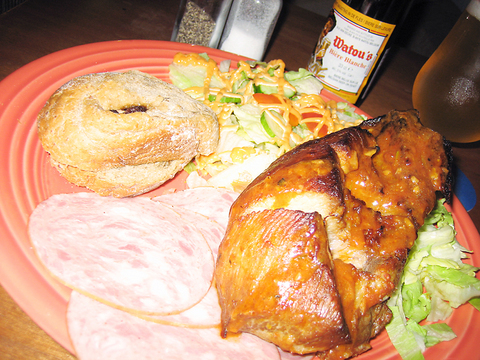Odeon means "house of song" in Greek and is thus a popular name for cultural venues and restaurants that want to give off a classy, artsy vibe. It's the name of a cinema chain in the UK, an events center in Saskatoon, Canada, a restaurant on New York's Broadway Avenue and a student district cafe in Taiwan.
Though the Cafe Odeon opus II (now known as CO2) on Xinsheng Road probably doesn't have much on the US$20 entrees at The Odeon on Broadway, it does a respectable job of creating a culture-friendly atmosphere. The theme for both the food and the decor is European, with an emphasis on Belgium. Picture albums on a bookshelf by the door chronicle owner Arvin Cheng's (
The cafe's location in an alley across from National Taiwan University works well to heighten the sense of artsy academia CO2 strives for. Written in chalk on a blackboard sign by the door is an explanation of how Cheng chose the name Odeon: "Odeon is the name of a stop on the Paris subway in an area where the arts and humanities flourish ... we hope that Odeon can provide a similar cultural space."

PHOTO: MEREDITH DODGE , TAIPEI TIMES
But CO2 is better known for providing a wide selection of Belgian beer, and that is not a bad thing. From the light to the dark to the positively fruity, CO2's beer fridge has what you're looking for. After walking around in the hot sun I decided to order a Watou's witbier (Flemish for "white beer") -- refreshing with a hint of jasmine.
The meal I ordered to go with it, a stack of pork ribs with beer wurst, wasn't exactly refreshing, but it certainly was replenishing. The salad was an unnecessarily large pile of lettuce and a few tomatoes criss-crossed with thousand-island dressing -- I only ate about a quarter of it. That's because I was thoroughly engaged with the hunk of meat sitting next to it.
The rib meat was tender and juicy and accompanied with an appropriate layer of tasty fat. Though the steak knife they gave me cut the meat easily off the bone, I worked up a sweat eating the ribs. Luckily I had saved some witbier to quench my thirst. I say luckily because the lame salad and the bone-dry raisin toast (they could have at least given me some butter) did nothing to counteract the ultra-heavy meatiness of the ribs. Overally, however, CO2 is a great place for a beer and a chat
with friends. Food is served till late.

On April 26, The Lancet published a letter from two doctors at Taichung-based China Medical University Hospital (CMUH) warning that “Taiwan’s Health Care System is on the Brink of Collapse.” The authors said that “Years of policy inaction and mismanagement of resources have led to the National Health Insurance system operating under unsustainable conditions.” The pushback was immediate. Errors in the paper were quickly identified and publicized, to discredit the authors (the hospital apologized). CNA reported that CMUH said the letter described Taiwan in 2021 as having 62 nurses per 10,000 people, when the correct number was 78 nurses per 10,000

As we live longer, our risk of cognitive impairment is increasing. How can we delay the onset of symptoms? Do we have to give up every indulgence or can small changes make a difference? We asked neurologists for tips on how to keep our brains healthy for life. TAKE CARE OF YOUR HEALTH “All of the sensible things that apply to bodily health apply to brain health,” says Suzanne O’Sullivan, a consultant in neurology at the National Hospital for Neurology and Neurosurgery in London, and the author of The Age of Diagnosis. “When you’re 20, you can get away with absolute

May 5 to May 11 What started out as friction between Taiwanese students at Taichung First High School and a Japanese head cook escalated dramatically over the first two weeks of May 1927. It began on April 30 when the cook’s wife knew that lotus starch used in that night’s dinner had rat feces in it, but failed to inform staff until the meal was already prepared. The students believed that her silence was intentional, and filed a complaint. The school’s Japanese administrators sided with the cook’s family, dismissing the students as troublemakers and clamping down on their freedoms — with

As Donald Trump’s executive order in March led to the shuttering of Voice of America (VOA) — the global broadcaster whose roots date back to the fight against Nazi propaganda — he quickly attracted support from figures not used to aligning themselves with any US administration. Trump had ordered the US Agency for Global Media, the federal agency that funds VOA and other groups promoting independent journalism overseas, to be “eliminated to the maximum extent consistent with applicable law.” The decision suddenly halted programming in 49 languages to more than 425 million people. In Moscow, Margarita Simonyan, the hardline editor-in-chief of the